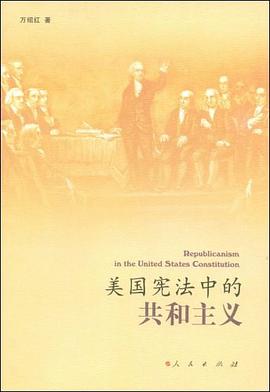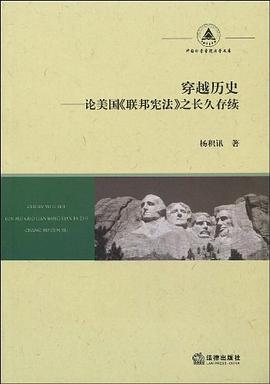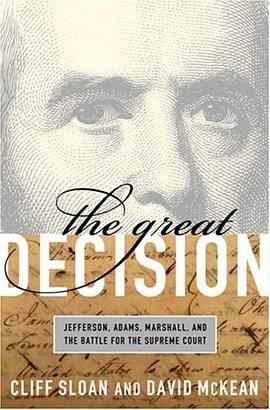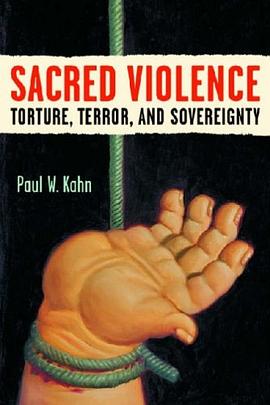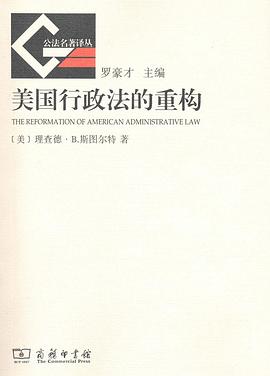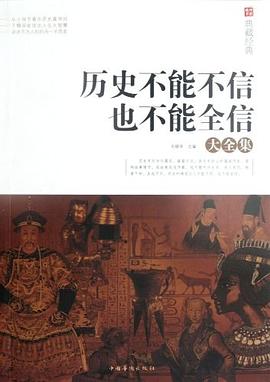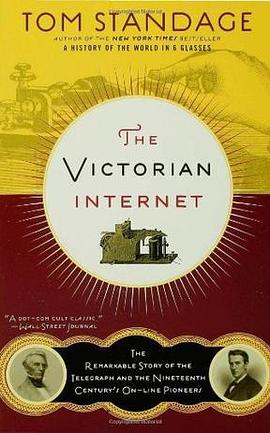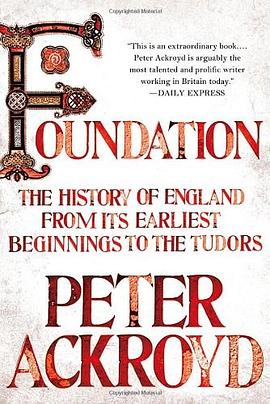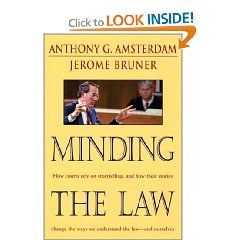

具体描述
Editorial Reviews
From Booklist
Perhaps the most unusual is the pairing of law professor Amsterdam and cultural psychologist Bruner, both of New York University, in a study that grows out of the "lawyering theory" seminar they have team-taught for 10 years. Their goal is to "make the familiar strange again," specifically, to examine the routine legal processes of categorization, storytelling, and persuasion, as well as the culture within which these processes take place. After discussing each subject (categories, narrative, rhetorics, and the dialectic of culture), they explore its operation in one or two significant Supreme Court decisions, "unearth[ing] concealed presuppositions, categorical pitfalls, narrative predilections, rhetorical constructions, cultural biases." Such interpretive dilemmas, they suggest, are inevitable, but may be less troublesome to the extent that the effects of categories, narrative, rhetorics, and culture are acknowledged, rather than ignored. Mary Carroll
Copyright © American Library Association. All rights reserved
Review
Most law professors teach by the 'case method,' or say they do. In this fascinating book, Anthony Amsterdam--a lawyer--and Jerome Bruner--a psychologist--expose how limited most case 'analysis' really is, as they show how much can be learned through the close reading of the phrases, sentences, and paragraphs that constitute an opinion (or other pieces of legal writing). Reading this book will undoubtedly make one a better lawyer, and teacher of lawyers. But the book's value and interest goes far beyond the legal profession, as it analyzes the way that rhetoric--in law, politics, and beyond--creates pictures and convictions in the minds of readers and listeners.
--Sanford Levinson, author of Constitutional Faith (20001205)
Tony Amsterdam, the leader in the legal campaign against the death penalty, and Jerome Bruner, who has struggled for equal justice in education for forty years, have written a guide to demystifying legal reasoning. With clarity, wit, and immense learning, they reveal the semantic tricks lawyers and judges sometimes use--consciously and unconsciously--to justify the results they want to reach.
--Jack Greenberg, Professor of Law, Columbia Law School (20001105)
Amsterdam, a distinguished Supreme Court litigator, wanted to do more than share the fruits of his practical experience. He also wanted to...get students to think about thinking like a lawyer...To decode what he calls "law-think," he enlisted the aid of the venerable cognitive psychologist Jerome Bruner...[and] the collaboration has resulted in [this] unusual book.
--James Ryerson (Lingua Franca 20010630)
It is hard to imagine a better time for the publication of Minding the Law, a brilliant dissection of the court's work by two eminent scholars, law professor Anthony G. Amsterdam and cultural anthropologist Jerome Bruner...Issue by issue, case by case, Amsterdam and Bruner make mincemeat of the court's handling of the most important constitutional issue of the modern era: how to eradicate the American legacy of race discrimination, especially against blacks.
--Edward Lazarus (Los Angeles Times Book Review )
This book is a gem...[Its thesis] is easily stated but remarkably unrecognized among a shockingly large number of lawyers and law professors: law is a storytelling enterprise thoroughly entrenched in culture....Whereas critical legal theorists have talked among themselves for the past two decades, Amsterdam and Bruner seek to engage all of us in a dialogue. For that, they should be applauded.
--Daniel R. Williams (New York Law Journal )
In Minding the Law, Anthony Amsterdam and Jerome Bruner show us how the Supreme Court creates the magic of inevitability. They are angry at what they see. Their book is premised on the conviction that many of the choices made in Supreme Court opinions 'lack any justification in the text'...Their method is to analyze the text of opinions and to show how the conclusions reached do not always follow from the logic of the argument. They also show how the Court casts its rhetoric like a spell, mesmerizing its audience, and making the highly contingent shine with the light of inevitability.
--Mitchell Goodman (News and Observer (Raleigh, North Carolina) )
What do controversial Supreme Court decisions and classic age-old tales of adultery, villainy, and combat have in common? Everything--at least in the eyes of [Amsterdam and Bruner]. In this substantial study, which is equal parts dense and entertaining, the authors use theoretical discussions of literary technique and myths to expose what they see as the secret intentions of Supreme Court opinions...Studying how lawyers and judges employ the various literary devices at their disposal and noting the similarities between legal thinking and classic tactics of storytelling and persuasion, they believe, can have 'astonishing consciousness-retrieving effects'...The agile minds of Amsterdam and Bruner, clearly storehouses of knowledge on a range of subjects, allow an approach that might sound far-fetched occasionally but pays dividends in the form of gained perspective--and amusement.
--Elisabeth Lasch-Quinn (Washington Times )
Stories and the way judges-intentionally or not-categorize and spin them, are as responsible for legal rulings as logic and precedent, Mr. Amsterdam and Mr. Bruner said. Their novel attempt to reach into the psyche of...members of the Supreme Court is part of a growing interest in a long-neglected and cryptic subject: the psychology of judicial decision-making.
--Patricia Cohen (New York Times )
In Minding the Law, lawyer Anthony Amsterdam and psychologist Jerome Bruner teach us how to read judicial opinions to see what the judges who wrote them did not see themselves…They have tried to expose the ways in which Supreme Court justices erect screens that "are often tissues of denial–denial that there is a problem, denial that the problem could be fixed if there were a problem, denial of judicial responsibility to fix the problem if it could be fixed. (The Federal Lawyer )
作者简介
目录信息
读后感
评分
评分
评分
评分
用户评价
《minding the law》这个书名,仿佛在低语着一种对规则的敬畏,一种对秩序的维护。我一直对国际法在国家交往中的作用充满兴趣,尤其是当今世界全球化日益加深的背景下。我希望这本书能探讨一下国际法的基本原则,比如国家主权、不干涉内政等,以及这些原则是如何在国家之间的关系中得到体现的。此外,关于国际条约的签订和履行,以及国际组织在维护世界和平与发展中的角色,我也非常想了解。在贸易、环境、人权等领域,国际法又是如何发挥作用的?这本书是否会涉及一些具体的国际争端案例,并从法律的角度进行分析?我期待这本书能为我打开一扇了解世界的新窗口,让我明白,法律不仅仅存在于国内,它也连接着我们与整个世界。
评分初拿到《minding the law》这本书时,我就被它低调而又不失格调的装帧所吸引。那种素雅的纸张,配上简洁的排版,营造出一种沉静的学习氛围。我一直觉得,法律的知识对于普通人来说,就像是一座难以逾越的高山,但这本书的出现,似乎为我们搭建了一座坚实的桥梁。我尤其好奇书中对民事诉讼程序的介绍。在我们日常生活中,难免会遇到一些需要通过法律途径解决的纠纷,比如交通事故、合同违约等。如果这本书能够清晰地讲解诉讼的流程,从起诉、证据收集到开庭审理,再到判决执行,让读者能够有一个整体的认知,那将是非常宝贵的。我希望它能解释清楚,在不同的情况下,我们应该如何准备证据,如何选择合适的诉讼方式,以及在整个过程中需要注意的细节。除了诉讼,书中对于一些常见的法律误区,比如“不知者无罪”的界限,或者“口头承诺是否具有法律效力”等问题的探讨,我也非常期待。这些都是生活中很容易被忽略,但却可能带来严重后果的问题。这本书的出现,让我觉得学习法律不再是一件遥不可及的事情,而是可以融入生活,成为我们保护自己、规范行为的有效工具。
评分《minding the law》这本书的书名,给我一种“留心法律,关注法律”的明确指引。作为一名普通的社会成员,我对法律在日常生活中的应用场景充满了好奇。我特别想了解的是,在婚姻家庭关系中,法律是如何保障家庭成员的权益的。比如,关于夫妻共同财产的分割,子女的抚养权问题,以及老人赡养等问题,法律是如何规定的?我希望书中能提供一些清晰的解答,让我们在面对这些人生重要节点时,能够有所依据,不至于因为对法律的陌生而做出不恰当的决定。此外,在邻里关系中,一些边界不清的问题,比如噪音扰民、宠物侵扰等,法律上是否有明确的规定来约束?这些看似鸡毛蒜皮的小事,却往往会影响我们的生活质量,如果能知道如何通过法律途径来解决,那将是非常实用的。这本书的排版和字体选择,也给我一种舒适的阅读体验,它不会让你感到视觉疲劳,反而让你愿意沉浸其中,细细品味。
评分拿到《minding the law》这本书,我最先被吸引的是它厚重而又透着一丝学究气的封面设计。这种低调的专业感,让我觉得这本书的内容一定扎实而有分量。我一直觉得,法律体系的构建和演变,很大程度上反映了一个国家或地区的社会发展和价值取向。因此,我非常期待书中能够对法理学的一些基本概念进行阐释,比如权利、义务、法律责任等。这些概念虽然听起来有些抽象,但却是理解所有法律条文的基础。这本书如果能以一种清晰易懂的方式,将这些基础概念介绍清楚,那对我来说将是莫大的帮助。我希望它能解释清楚,法律是如何从道德、习惯等社会规范中发展出来的,以及在现代社会中,法律是如何不断适应和更新的。此外,关于不同法律部门之间的关系,比如公法和私法、实体法和程序法的区分,我也希望能有更深入的了解。这本书给我的感觉,就像是一张地图,它能够帮助我绘制出整个法律世界的轮廓,让我不再感到迷茫和无从下手。
评分《minding the law》的书名,给我的第一感觉就是一种“责任感”和“自觉性”,它提醒我们要主动地去学习和遵守法律。我一直对劳动法领域非常关注,毕竟我们大部分人的时间都投入在工作中,了解劳动法的相关规定,对于保障我们的劳动权益至关重要。我希望这本书能清晰地阐述劳动合同的签订、履行和解除等相关法律问题,以及在发生工伤、欠薪等情况时,我们应该如何通过法律途径来维权。此外,关于工作时间、休息休假、加班费等具体规定,我也希望能有详细的介绍。这本书的装帧设计,那种略带复古的质感,仿佛在诉说着法律的厚重和历史的沉淀,让我对接下来的阅读充满了期待。它不仅仅是一本法律书籍,更像是一位循循善诱的老师,引导我走向更加公平和有序的工作环境。
评分这本书的书名《minding the law》给我留下了一个非常深刻的印象,它不仅仅是一个简单的书名,更像是一种生活态度,一种对规则的尊重和对秩序的维护。在我看来,这本书就像是为我量身打造的一本“法律指南”,它不是那种高高在上、离我们生活遥不可及的学究式著作,而是真正深入到我们日常的点滴,告诉我们如何在遵守法律的前提下,更好地生活,更好地与他人相处。我尤其感兴趣的是书中关于合同法的阐述,无论是租房合同、劳动合同,还是消费合同,都与我们的生活息息相关。书中是否会详细分析合同的构成要素,以及在签订合同时需要注意的陷阱?我希望它能够提供一些实用的建议,比如如何审查合同条款,如何在出现纠纷时有效维护自己的权益。另外,对于消费者权益保护这部分内容,我更是充满期待。在商品琳琅满目的今天,如何识别劣质产品,如何处理退换货问题,这些都是我们消费者常常会遇到的困扰。这本书如果能在这方面提供一些清晰的指导,那无疑会大大提升我们的生活幸福感。我喜欢那种能够引发思考的书籍,这本书给我的感觉就是如此。它不仅仅是知识的传递,更是一种智慧的启迪,让我开始反思自己是否真正地“mind the law”,是否在生活中处处留心,做到有法可依,有据可查。
评分这本书的封面设计,那种简约而不失力量感的视觉风格,恰恰契合了我对法律的理解——严谨,却又充满生命力。《minding the law》这个书名,更是让我联想到法律在维护社会公平正义方面的作用。我一直想深入了解一些关于宪法的内容,因为宪法是一国法律体系的基石,它规定了国家的根本制度和公民的基本权利。这本书是否会详细介绍宪法的产生背景、基本原则,以及它与普通法律之间的关系?我特别想知道,在公民的权利受到侵犯时,宪法是如何提供保护的?比如,言论自由、结社自由等基本权利,在宪法中是如何得到保障的?这本书的出现,让我觉得,理解宪法,就是理解国家最核心的“规则手册”,从而更好地理解我们作为公民的地位和权力。
评分《minding the law》这本书的书名本身就充满了一种力量,它传递的信息是,我们要有意识地去关注和遵守法律。我一直对刑法所涉及的社会规则和惩罚机制很感兴趣,虽然我并不是法律专业人士,但了解一些基本的刑法知识,对于我们认识社会、认识人性的复杂性非常有帮助。我希望书中能对一些常见的犯罪行为进行解释,比如盗窃、诈骗、诽谤等,并且说明这些行为在法律上是如何界定的,以及可能承担的法律后果。当然,我并不期望这本书会详细到教人如何打官司,而是希望它能提供一种宏观的视角,让我们理解法律在维护社会秩序方面所扮演的重要角色。此外,关于一些新兴的法律问题,比如网络犯罪、数据隐私等,我也非常希望能在书中找到相关的论述。在数字时代,这些问题越来越突出,了解相关的法律法规,对于保护我们自身的信息安全至关重要。这本书的封面设计,那种深邃的蓝色,仿佛蕴含着无尽的智慧,让我对即将翻开的文字充满了期待。它不仅仅是一本书,更像是一次与法律的对话,一次对社会规则的深度探索。
评分这本书的封面上,那稳重而又不失活力的配色,瞬间就抓住了我的目光。我一直认为,法律并非冰冷的条文,而是渗透在我们生活方方面面的智慧。《minding the law》这个书名,更像是一种行动的号召,提醒我们要时刻关注和运用法律。我非常好奇书中对于行政法的讨论,毕竟政府的各项管理和服务,都离不开行政法的支撑。比如,在办理各种证件、审批项目时,行政机关的权力边界在哪里?我们作为公民,又有哪些权利可以用来监督和约束行政机关的行为?我希望这本书能详细解释一下行政许可、行政处罚等概念,并且说明我们在面对行政机关时,应该如何有效地表达自己的诉求,保护自己的合法权益。这本书的出现,让我觉得学习法律不再是一件遥不可及的事情,而是可以融入生活,成为我们与政府互动的“游戏规则”。
评分这本书的封面设计就足够吸引人了,那种沉静而又充满力量的蓝色调,搭配上银色的烫金字体,一股严谨而又不失深度的气息扑面而来。翻开书页,一股淡淡的油墨香混合着纸张特有的温润感,瞬间将我带入了一个全新的世界。我一直对法律在社会运行中的作用充满好奇,总觉得它像一个无形的手,悄无声息地塑造着我们的生活,却又常常因为晦涩难懂而让人望而却步。《minding the law》似乎正是为我这样的人准备的。它没有直接抛出枯燥的法条,而是从一些生活化的场景切入,让我看到法律的影子是如何与我们的日常点滴交织在一起的。例如,它可能探讨了邻里之间因为一些小事而引发的纠纷,或者是在商业交易中,看似简单的合同背后隐藏着的法律风险。我特别期待书中能有关于知识产权的讨论,毕竟在如今这个信息爆炸的时代,如何保护自己的原创成果,避免侵权,是一个非常现实的问题。这本书的章节划分也显得很有条理,每一部分都好像在引导我一步步深入理解法律的脉络,从宏观的法律体系到微观的个体权益,层层递进,让我感觉到学习过程的顺畅与愉悦。读完一章,我常常会停下来,回味其中的观点,思考它是否也曾影响过我自身的生活,或者我在未来会如何运用书中的知识来规避潜在的麻烦。这种“学以致用”的期待,让我在阅读过程中充满了动力。
评分 评分 评分 评分 评分相关图书
本站所有内容均为互联网搜索引擎提供的公开搜索信息,本站不存储任何数据与内容,任何内容与数据均与本站无关,如有需要请联系相关搜索引擎包括但不限于百度,google,bing,sogou 等
© 2026 book.wenda123.org All Rights Reserved. 图书目录大全 版权所有


